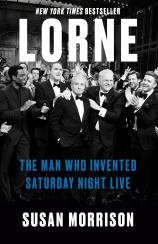Excerpt
Excerpt
Lorne: The Man Who Invented Saturday Night Live

Chapter One
Toronto the Good
When Lorne Lipowitz was five years old, he decided to run away from home. His mother, Florence, played along, packing a little bag for him and walking him to the door of their house in the leafy Forest Hill neighborhood of Toronto. She asked him if he knew where he would be staying. “I’m going to live with a family that loves me,” he told her. Lorne’s little brother, Mark, who had been sitting on the stairs crying, looked up at his brother in the doorway. “What if they don’t have a television?” he asked. It was 1950, and the Lipowitzes were one of the families on the block whose living room contained a TV set. Lorne paused at the threshold. He put the suitcase down.Before television, there were the movies. For as long as Michaels can remember, his parents would sit around the kitchen table with his mother’s parents and talk about Humphrey Bogart and Spencer Tracy and James Cagney. His maternal grandparents, Moishe and Sarah Becker, owned a movie theater, the College Playhouse, near the University of Toronto. (Florence had met her husband, Henry, whom she called “Lefty,” when she was working in the box office.) Each week they went downtown to the film exchange to choose a new picture. Natural programmers, they had a feel for what their neighborhood audience would show up for. The family had passionate opinions about movie stars, and discussed them with an easy intimacy. “They would stick with Jimmy Cagney in a bad movie because, on some level, they didn’t want to let him down,” Michaels recalled. The movie-star talk was so fond and familiar that Lorne grew up assuming that his parents and grandparents were friends with Bogart and the rest.
After school, Lorne would often walk to the College Playhouse to be looked after by his grandmother. Some days he would do his homework in the lobby; sometimes he’d slip into the theater and watch a bit of whatever was on, maybe a Randolph Scott picture.
If Lorne’s grandmother babysat the boys at night, she would turn on The Colgate Comedy Hour with Martin and Lewis, or Sid Caesar’s Your Show of Shows, and explain how the people on the small black-and-white screen fit into the larger ecosystem of show business. Lorne listened as she described the almost Darwinian way the performers had adapted, as vaudeville gave way to radio, and radio to movies, and movies to television. “She’d explain that Jack Benny had been a handsome young vaudeville player, then became a gray-haired man in radio; then, for television, he dyed his hair black,” Michaels remembers. His durable interest in the overlapping and interweaving of Hollywood generations began here.
Michaels and his friends went to the movies every Saturday afternoon, and whatever was playing is what they saw. He and Mark would ride their bikes to a theater on Eglinton Avenue. (Their sister, Barbara, nine years younger than Lorne, was too small for the movie outings.) Every so often, their father would drive them, a notable occasion for Lorne, who was always hungry for time with his dad. They saw westerns, Bowery Boys features, or adventure pictures, like The Crimson Pirate with Burt Lancaster. Lorne’s favorite movies, Casablanca for example, were hard-boiled with a core of sweetness. He did not like scary movies and still doesn’t. Like many kids, at four he was undone by The Wizard of Oz. “Nobody prepared me for the idea of pure evil,” he told me. When the flying monkeys darkened the screen, he had to be carried out of the theater.
Henry Lipowitz’s father, Aaron, had been a furrier who didn’t have great business sense. As an adult, Henry took over the family fur concern and turned it around, becoming successful enough to put his brother Harold through medical school and to go into an early semi-retirement. Henry was quiet, Florence a talker. The marriage wasn’t a great love affair, but Michaels remembers his parents as being close. Florence was an archetypal Jewish mother. “They had their way of dealing with each other,” Michaels recalled. “If she was driving him crazy with her anxiety, he would go out for the late edition of The Globe and Mail at ten o’clock at night. She’d say, ‘When will you be back?’ He’d say, ‘Soon.’ ”
Family friends describe Florence as having a “foghorn voice” and being “a real character.” Paul Pape, a schoolmate of Lorne’s, recalls her saying—for years on end—that a doctor had given her six months to live. “Comedy in that household was a defense,” Lorne’s cousin Neil Levy said. Rosie Shuster, a neighborhood girl who met Lorne when they were teenagers, said of Florence, “She would build Lorne up like he was a god amongst men. Unless he was there. Then she would tear him down.” (When her son wasn’t in earshot, Florence used to brag that he’d been so precocious, she used to throw magazines into his crib.)
“My mother was from a generation that kept the compliments in a tin box on a top shelf,” Michaels said. “And there was a little bit of dust on it because it wasn’t taken down very often. If you did really well, which I seldom did, she’d be on the phone, bragging about it. But she’d never say much to me. That was what I thought was normal.” But around the neighborhood, Florence was known as a natural problem-solver. She’d open the door to her tidy kitchen to a troubled visitor and say, “Come into the mess.” She’d put on a pot of coffee, light a cigarette, and listen. When Lorne came home from school, he often found a person sitting at the kitchen table with his mother, crying.
She was also a natural manipulator. As a girl, she’d loved playing the piano, pounding out the themes from Ben-Hur and other silent pictures, learned from the sheet music her parents brought home. When she married Henry, they didn’t have a piano. Hoping to acquire one, she pestered young Lorne about whether he’d like to take piano lessons. “She later claimed that I told her that I just wanted to play baseball,” Michaels recalled, suggesting an early guilt trip.
His memories of his father have a more wistful cast. He once took Lorne to a diner and encouraged him to order everything he wanted. Lorne couldn’t finish the hotdog, hamburger, and french fries that he’d ordered, and his father told him, with some solemnity, “Your eyes are bigger than your stomach.” It made an impression—Michaels goes so far as to call it “seminal”—and he links it with skills he’d later use as a producer (“You have to figure out what the right amount of something is”). It seems likelier that the novelty of having his father’s undivided attention was as memorable as the platitude. “It was rare, and thrilling, that I went anywhere alone with my father,” he said.
On the desk in Michaels’s satellite office on the ninth floor of 30 Rock is a framed photograph of him as a toddler, nestled on the lap of his Aunt Joyce. Florence’s youngest sister. Joyce had married a successful businessman named Morris Levy, known as Pep. The Levys were richer than the Lipowitzes and lived in a more stylish part of Forest Hill, in a mansion with an indoor swimming pool and a tennis court. (In 2020, the house was listed for sale at $18 million.) They also had a lakefront compound in Balfour Beach, a Jewish summer colony an hour north of Toronto. Joyce was a warm, imaginative woman with an easy laugh, less volatile than Florence, and she and Lorne were close. She had dreamed of directing and was a natural stage-mother; she and her husband attended every school play their nephew was in. Lorne was drawn, somewhat guiltily, toward this household of bright, attractive people, which functioned as the family seat, the locale of seders and celebrations. The Levys hugged; the Lipowitzes didn’t.
“Everybody saw something special in Lorne,” Neil Levy, who grew up in his cousin’s shadow, said. The uncles and aunts curated his childhood witticisms, and he understood that much was expected of him. The population of Forest Hill was largely second-generation Jews, families who had arrived in Toronto, a Calvinist outpost of the British Empire, around the turn of the century. They had big dreams for their children. “This was a hothouse,” Lorne’s friend Paul Pape said. “Everybody was smart. Everybody was a super-achiever.” The common goal among Lorne’s schoolmates was getting into the University of Toronto and fulfilling their parents’ plan for them to become professionals—lawyers or doctors.
Excerpted from LORNE by Susan Morrison. Copyright © 2025 by Susan Morrison. All rights reserved. No part of this excerpt may be reproduced or reprinted without permission in writing from the publisher.
Lorne: The Man Who Invented Saturday Night Live
- Genres: Biography, Nonfiction
- paperback: 672 pages
- Publisher: Random House Trade Paperbacks
- ISBN-10: 0812988892
- ISBN-13: 9780812988895



